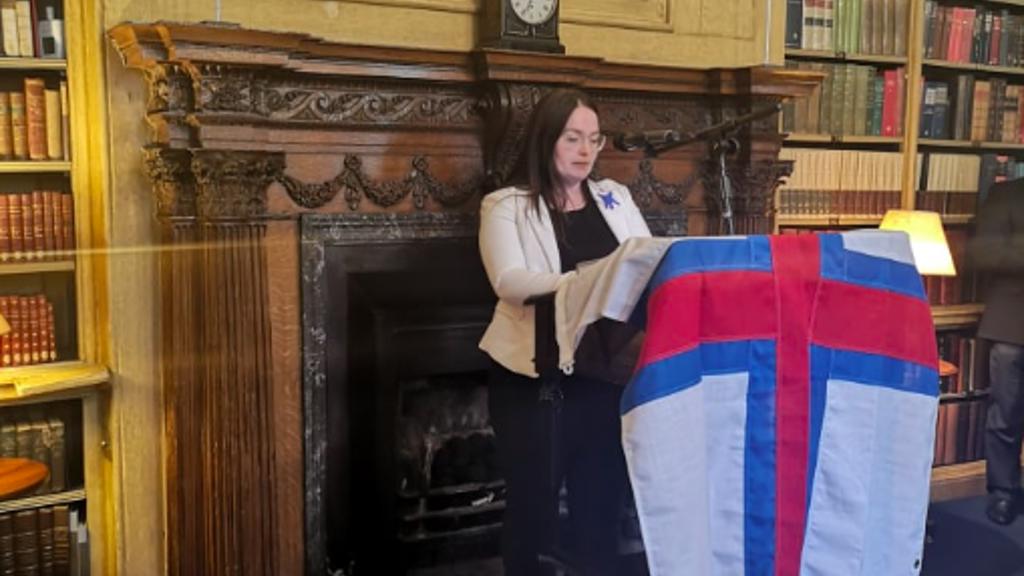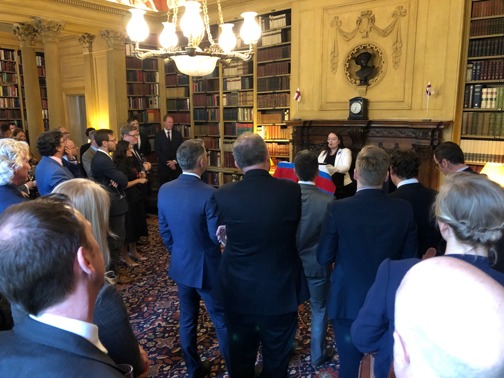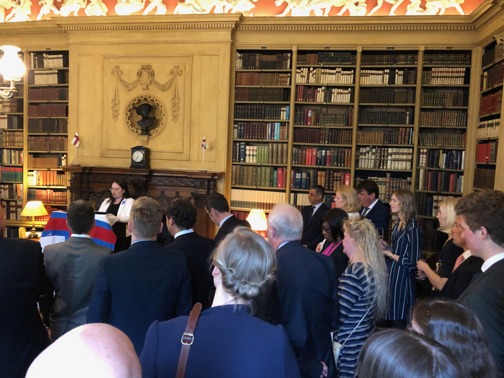
Mikudagin 24. apríl varð Merkið heiðrað á føroysku sendistovuni í London.
Føroyski sendimaðurin, Áki Johansen, hevði boðið Honnu Jensen, landsstýriskvinnu í undirvísingar- og granskingarmálum til London at halda flaggdagsrøðu í ár. Umleið 100 fólk vórðu samankomin fyri at hátíðarhalda dagin - bæði føroyingar, bretar og onnur úr øðrum londum.
Hanna Jensen legði í røðu síni dent á sínamillum sambandið millum Føroyar og Ongland - frá tíðini undir krígnum, tá Merkið varð viðurkent og fram til í dag.
Hon tók støði í teimum fýra ungu monnunum, sum teknaðu Merkið í Keypmannahavn, og samanbar við tey mongu føroysku lesandi, sum framvegis leita út í heim - antin bókstaviliga ella á netinum - og nýta sína nýfunnu vitan til at ávirka og menna føroyska samfelagið.
Røðan kann her lesast í fullari longd:
Excellences ladies and gentlemen, it is an honor for me to be here today - and to have the opportunity to give this speech on this special occasion: The day of the Faroese flag, named Merkið.
***
Let me start by taking you back in time. Exactly one hundred years back, to be precise.
I want you to picture that we are walking through the dark and narrow corridors of a small student’s hostel in the heart of the Danish capital, Copenhagen.
As we’re walking we can hear a vivid discussion – and if we listen carefully we will be able to define the voices of four young men.
In case they have left the door ajar, we can see them sitting round a table with drawings and sketches. Their excitement is clear as day - as dusk falls and darkens the room.
Undoubtedly these four young men are on to something big. Something not seen before. Something revolutionary. We can tell by their obvious excitement.
These four young men are all Faroese. They have all moved to Denmark to study. And in Copenhagen they have been influenced by the strong romantic trend of the time.
In this big, foreign city, they meet the world. But in that meeting, their feelings and thoughts of their small native country are strengthened.
Their names are Emil Joensen, Janus Øssurson, Pauli Dahl and Jens Olivur Lisberg.
And the many drawings and sketches that are scattered around the table are the very first drawings of the Faroese flag created by Jens Olivur Lisberg’s competent hand.
***
Now.. if we were to look at their doings in a very strict legal manner – these four young men were in fact on the verge of committing a crime. Because for a Danish colony to have a flag of its own, was in fact against the law one hundred years ago.
But the funny thing is, that today we celebrate that they dared – and that they did. By June 1919 they had put their illegal flag-plans to practice. And for the very first time in history the Faroese flag fluttered in the wind – quickly embraced by some of the Faroese living in Denmark.
But resistance of the flag was strong. Obviously in Denmark – but also among some people in the Faroe Islands.
And though it was there it was never really acknowledged.
***
Years went by and with the Nazis - war was upon us.
The Faroese ships were in desperate need of a flag other than the Danish. They needed to be distinguished from Denmark, because Denmark was occupied by Germany – and the Faroe Islands were occupied by Britain.
The many fishing smacks were all selling their fish in the UK, where food supplies were low.
At last the sketches, which the four young men in that dark student’s room in Copenhagen made, were acknowledged.
»Merkið« became the official flag of the Faroe Islands.
***
What I find remarkable is the fact that it was our youth abroad that picked up on the international trends, embraced them – and put them into a Faroese perspective.
They went into the world, saw, learned and experienced - and carried the world back home with them, when they returned. They were way ahead of their fellow country-men and were heavily criticized - but some years later their audacity saved countless Faroese lives – mainly on the sea.
***
To be influenced – and to influence others is part of being human. But in the meeting with others, you also have a great opportunity to ponder over your own identity and strengthen it.
When you experience something different from you, you yourself are defined.
Here - in multi-cultural London – this interplay is indeed a prerequisite and it has been so for many, many years.
However - in the very monotonous and remote Faroe Islands one hundred years ago, people were distanced from the trends and the thoughts of the world.
***
The second war changed that, as the Faroe Islands were occupied by the lovely British soldiers – of whom we still speak very dearly.
They brought the outside world to the Faroe Islands – and it gave people the opportunity to see another perspective. They learned another language, saw other traditions and many destinies caught unexpected directions these years.
But it also sharpened their thoughts and reflections of themselves.
***
In the tiny town of »Norðragøta«, in the old house that I now live in - my father in law grew up. And during the war, British soldiers were common guests in the house.
There was actually an arrangement, where voluntary Faroese families opened their homes to the British boys who were so far away - both from home and from their families. My husband’s grandmother was one to volunteer in this arrangement.
She would talk to the soldiers as best she could, and give them a homecooked meal or a cup of coffee. And the bonds of affection were mutual. My father in law remembers how the British soldiers often left a coin under the cup when they left – and they cared for him and spent time with the children.
And his mother felt so sorry for these young men, caring so dearly for her children – probably because they missed their own.
These regular meetings between the soldiers and the locals had a great cultural impact in the Faroe Islands. When the siblings of my father in law were young they spoke English nearly fluently.
And still today we see English words that have been fully integrated into the Faroese language. One of the first words Faroese children learn – for instance - is “bye-bye”.
But even though British influence was huge these years, this meeting with the outside world also sharpened our identity as Faroese. We became more aware of who we were.
And when the war was over, there was no way, we could ever go back to the Danish flag.
We were Faroese. And we needed a Faroese flag.
***
Today the world has nearly no limits – no boundaries.
With the rise of the internet even the remote Faroe Islands have become more like London – in touch with so many nationalities, so many trends and thoughts on a daily basis.
And even though Faroese students still study in Copenhagen - a great deal of them also come to Great Britain to study.
My little brother – who actually is here today – is one.
And I am happy that we have established this opportunity. Because you are in the leading field when it comes to higher education and research. And I strongly believe that the experiences and the networks that our youth can build here, will be of great benefit to our ongoing connections.
And it will also be of benefit to the Faroe Islands on a higher scale. Especially now when we are planning on upgrading the university of the Faroe Islands with a campus of international standards - and strengthening our high-level research.
And just like the four young men who designed »Merkið« - which we honor today - many of the youngsters coming here to study embrace the different perspective – and then they use it to redefine the old Faroese cultural inheritance.
We have musicians who – after studying in Great Britain – have taken the traditional Faroese music to new heights.
We have designers who – after studying in Great Britain – are working the old Faroese wool and knitting in completely new ways and manners.
We have painters, filmmakers, psychologists, computer scientists, and so on and so forth – who have been here, met the world, defined themselves – and have come back to help reshape our society.
Because in the meeting with others you also meet yourself.
And so Great Britain still is influencing us – just as you were during the war.
The bonds between us are still strong.
I am happy to say, that one of the first country you made an agreement with after the Brexit referendum, was the Faroe Islands. We were even the first country to sign the ongoing agreement here in London. I take this as a strong sign – not only of our geographical closeness, but also of the kindship, the respect and the advantages that run both ways.
We are for instance one of your biggest fish suppliers – regarding cod and haddock – just as we were during the war when so many of your other food imports were shut down by the Nazis.
And when it comes to the oil industry, we are in close cooperation, and our laws are being made to fit yours.
Historically speaking we have even influenced a part of research in Great Britain.
Our very first academic Doctor, Dr. Jákup Jacobsen, who travelled our islands and documented the various dialects and traditions in Faroe Islands, didn’t stop there.
In the years 1893-95 he even travelled the Shetland Islands and gathered the remains of the original language, Norn. His "Dictionary of the Norn Language in Shetland" to this day is the unrivaled source-book of information on the origins and usage of the Shetland tongue.
In 2006 I was invited to attend a conference in the Shetland Islands regarding Dr Jacobsen and his big undertaking in securing the Norn language. To this day the work of a Faroese researcher is being appreciated and valued in the Shetland community as well as in the field of academics.
There have even been courses of Faroese language in British universities.
This morning I visited the University College London and I was happy to tell them, that the faculty of Faroese Language at our University in Tórshavn would be glad to co-operate to keep this opportunity a continuous option.
***
You see - still today language is of very great importance to the Faroe Islanders.
During the war many of the Faroese children – like my father in law and his siblings – were nearly fluent in English.
Now English is a compulsory subject in school, and every child speaks it.
But because of the immense English influence on the internet, we are now being made very aware of the fragility of our own little language.
We need to put in an extra effort to care for and develop it so it can resist the heavy English influence that now starts already with our toddlers and their screens.
This is something we are concerned about.
The language – the mother tongue – is absolutely essential to the identity. It carries the gems of our culture, it binds us to our history and it is the strongest definition of our nationality.
It is one of the strongest reasons to why we think of ourselves as a distinct nation – and hence it has a strong connection to the desire to have a distinct flag.
It’s fair to say, that todays’ language Technology is a threat to smaller language communities. But as seen so many times before: a challenge can pull a people together and unite it for a higher cause. This new language issue that has risen from the digital revolution has summoned my people to find the best solutions to secure the Faroese language.
Knowing - of course - that this technological and linguistic challenge at the same time is a great opportunity.
***
And one of the best proofs of this great opportunity is found right in my old house in the little village of Norðagøta. The house where my father in law was born and grew up – and where new perspectives were being secured by the British soldiers during the war.
Today there still is a heavy British influence in the house.
Because in a small office room (around 8 square meters) – my husband is meeting the world.
He is researching to become a Doctor of Business Administration on Henley Business School through Reading University.
And he is doing so from our very home.
As I approach the door to his tiny office, I can often hear a vivid discussion – and if I listen carefully I am able to define the voices of many different persons.
In case he sometimes leaves the door ajar, I can see him sitting by the desk with his computer screen where he is connected to other researchers around the world. Often their excitement is clear as day, as dusk falls and darkens the room.
Frequently, I am sure of the fact that they are on to something big. I can tell by their excitement.
So you see -
Even though so much has happened, even though a hundred years have passed, there are still many similarities to the four young men in Copenhagen whom we visited in the beginning of my speech.
Firstly: My husband – and all of our students and researchers - are still being influenced by the thoughts of the world. They are building on global research achievements and trends in the world.
And secondly: They still take their newly found knowledge and ideas into use back home, continuously developing and redefining our little society, our norms, our culture and our possibilities.
But there are of course some crucial differences as well.
My husband only needs to go out into the world a few times a year – as the world is brought to him via the internet.
And the fellow students and supervisors with whom he is excitingly having vivid discussions are not fellow Faroese, but international – from the UK, all over Europe, the USA, Australia, China, India and so on.
And there is indeed another crucial difference.
He meets the world as a Faroese – under our very own Faroese flag. And to us, that difference is huge – and worth celebrating.
***
And to complete the story I can tell you that by the little table in our little kitchen in our tiny house in Norðagøta, where once British soldiers sat and enlightened my family in law with their perspective of the world – this summer some of my husband’s co-researchers will sit and tell us theirs.
And just as it has been done since the flag, Merkið, officially confirmed us as an independent nation in 1940, we will listen to our guests, learn - and be defined ourselves as Faroese once more.
So thank you for the cooperation, thank you for being a mirror in which we can define ourselves,
And thank you so much for your time.
Happy flag day – góðan flaggdag øll somul!




